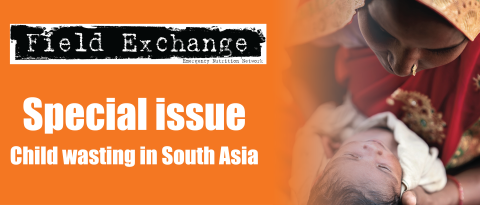Report of the South Asia ‘Stop stunting: No time to Waste’ conference
Report summary1
In May 2017 the first three-day South Asia regional ‘Stop Stunting’ conference was convened by the South Asian Association for Regional Cooperation (SAARC) and the United Nations Children’s Fund (UNICEF) Regional Office for South Asia (ROSA). Entitled No Time to Waste, the conference brought together over 90 government representatives, academics, United Nations partners and civil society organisations from across South Asia to exchange experiences in addressing wasting in the context of broader nutrition programming. The conference aimed to position the care of children with severe wasting as an essential intervention to support optimal nutrition and development in the first years of life in South Asia.
Presentations by country and global actors explored the state of child wasting in the region, sharing best practices and providing insights into potential mechanisms to scale up services for severely wasted children. A key theme emerging from the conference was the need for a transformation in thinking and approaches in the region, shifting from a focus on stunting towards addressing all forms of undernutrition, including wasting. In response, countries developed visions for the future, outlining key advocacy, policy, programme and research priorities to scale up interventions.
Conference participants developed a set of 10 key actions to accelerate progress in the care of severely wasted children, as follows:
- Wasting must be addressed with greater urgency across all countries in South Asia.
- Wasting and stunting reduction should be addressed as two interconnected priorities.
- Programmes should deliver essential nutrition actions to prevent wasting and stunting and to treat severe wasting when preventative actions fail.
- Health-system actors have a primary role in delivering actions to prevent wasting and stunting, together with other sectors.
- Community-based platforms are needed to identify and refer wasted children as early as possible.
- Community-based care and treatment of wasting is needed to maximise the number of children successfully treated.
- Inpatient care is essential for severely wasted children with medical complications.
- Therapeutic food should conform to World Health Organization (WHO) specifications and can be produced in most countries.
- Policies and guidelines on the care and treatment of severe wasting should align with the latest WHO guidelines.
- Quality programme data are essential to track progress and inform scale-up of programmes.
The conference report concludes that, “with children’s survival, growth and development at stake, as well the economic prosperity of nations, it is essential that countries across South Asia put these key actions into practice.”


